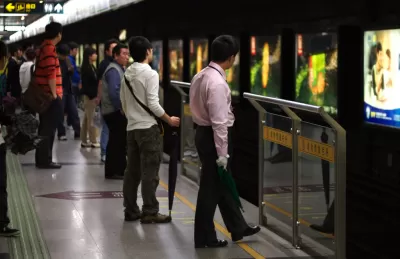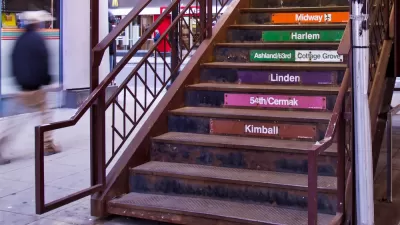The problem, Paul Rosenstiel writes, isn't a scarcity of capital. It's an unwillingness to make investing in infrastructure a lucrative choice for private capital.

It's becoming a recurring theme to remark on what China can do that we can't. According to Paul Rosenstiel, former deputy state treasurer for California, we've become used to a diminished version of what's possible. "During the nearly identical years that the Shanghai Metro went from nothing to the largest subway system in the world, California struggled just to replace a few miles of the San Francisco-Oakland Bay Bridge damaged by the 1989 Loma Prieta earthquake."
Gloomy as that sounds, Rosenstiel says the money's there waiting to be invested. "We don't need capital. What we need is a revenue source to provide a return on that capital. But for a quarter-century, we haven't been able to find the political courage to leverage that capital by taking such an obvious step as raising the federal gasoline tax."
True momentum on infrastructure would mean a move away from "bromides" like public-private partnerships or infrastructure banks. If private investors could be certain of a return, either via higher taxes or user fees, they'd be happy to kick in the billions necessary. What we need is more decisiveness about what to build in the first place.
FULL STORY: China Can Build Infrastructure. Why Can’t We?

Planetizen Federal Action Tracker
A weekly monitor of how Trump’s orders and actions are impacting planners and planning in America.

Chicago’s Ghost Rails
Just beneath the surface of the modern city lie the remnants of its expansive early 20th-century streetcar system.

San Antonio and Austin are Fusing Into one Massive Megaregion
The region spanning the two central Texas cities is growing fast, posing challenges for local infrastructure and water supplies.

Since Zion's Shuttles Went Electric “The Smog is Gone”
Visitors to Zion National Park can enjoy the canyon via the nation’s first fully electric park shuttle system.

Trump Distributing DOT Safety Funds at 1/10 Rate of Biden
Funds for Safe Streets and other transportation safety and equity programs are being held up by administrative reviews and conflicts with the Trump administration’s priorities.

German Cities Subsidize Taxis for Women Amid Wave of Violence
Free or low-cost taxi rides can help women navigate cities more safely, but critics say the programs don't address the root causes of violence against women.
Urban Design for Planners 1: Software Tools
This six-course series explores essential urban design concepts using open source software and equips planners with the tools they need to participate fully in the urban design process.
Planning for Universal Design
Learn the tools for implementing Universal Design in planning regulations.
planning NEXT
Appalachian Highlands Housing Partners
Mpact (founded as Rail~Volution)
City of Camden Redevelopment Agency
City of Astoria
City of Portland
City of Laramie



























